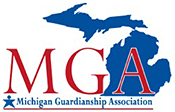Click on the appropriate question to view.
Guardians may bill $60/month for Wards receiving Medicaid when the Ward is placed in a nursing home. In order to collect this reimbursement, the guardian will need to complete the Medicaid application answering the question that “guardianship fees are needed”. If an application has already been filed, it will need to be filed again. The patient pay amount is reduced by $60 and the Guardian deducts the monthly amount directly from the Ward’s monthly check.
When the Ward lives independently, Guardians must check with the Probate Judge in the County where the guardianship was established or where the guardianship is now supervised. The judge determines what a guardian may charge for fees. This amount varies from county to county and is dependent of the size on the Ward’s estate. All fees must be approved by the Court before the Guardian may assess them.
When the Ward lives independently, Guardians must check with the Probate Judge in the County where the guardianship was established or where the guardianship is now supervised. The judge determines what a guardian may charge for fees. This amount varies from county to county and is dependent of the size on the Ward’s estate. All fees must be approved by the Court before the Guardian may assess them.
Typically if a Ward is placed in an Adult Foster Care facility, there are no funds from which to assess a fee. Again, this will depend of the assets of the Ward. If the Ward has an estate, fee determination and approval of fees are made by the Court. In general, Wards placed in Adult Foster Care are pro bono.
In instances where the Ward possesses an estate, both the Guardian and the Conservator may charge a fee; however, all fees are subject to the Court’s approval. If a fee is approved, the Guardian must submit an invoice for the approved amount to the Conservator in order to receive payment.
(Date posted 08-11-2011)
Michigan does not have limits in caseload size. The National Guardianship Association standards recommend 25 per person. That is not the norm in Michigan due to limitations in the numbers of available guardians in most counties. We are not aware of any overall system used to weigh caseload size. Some offices accept only a few new cases a month as it is not unusual to take several months to stabilize a ward’s situation. If a ward lives independently, stabilizing may take longer. Many agencies are able to accept more cases when wards live in adult foster care or nursing homes due to the 24 hour care that is already provided.
(Date posted 11-03-2011)
Note: Many Probate Courts host a website where forms and other information are available. Probate Courts are not able to provide legal advice. Many issues concerning guardianship and conservatorships are complex and dependent on factors too numerous to capture in a document such as this. The applicable Probate Court is the authority when questions arise.
